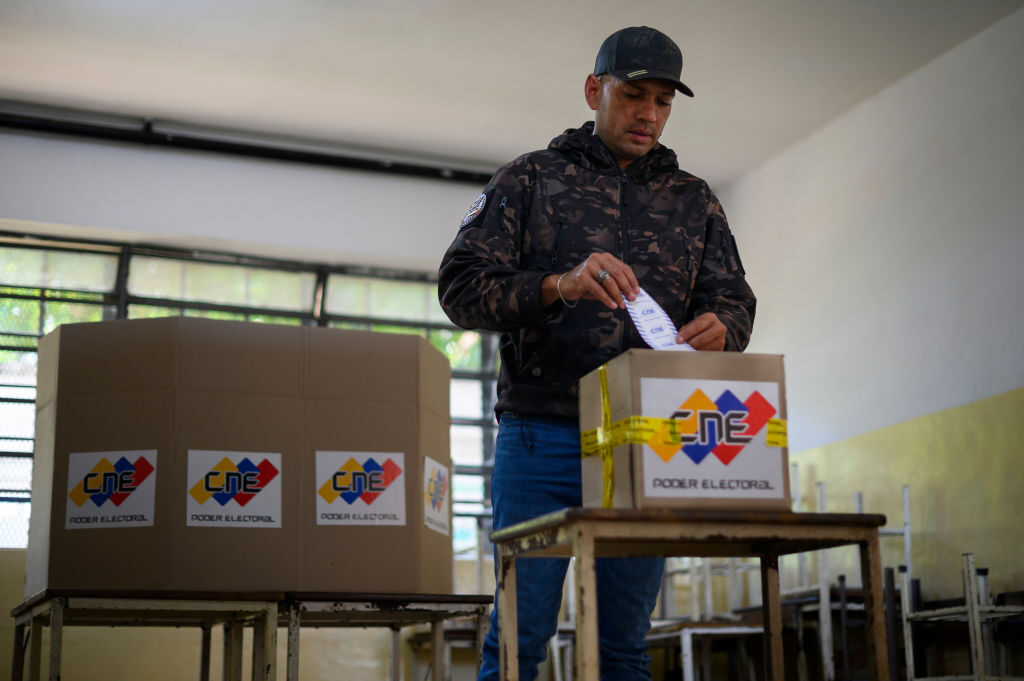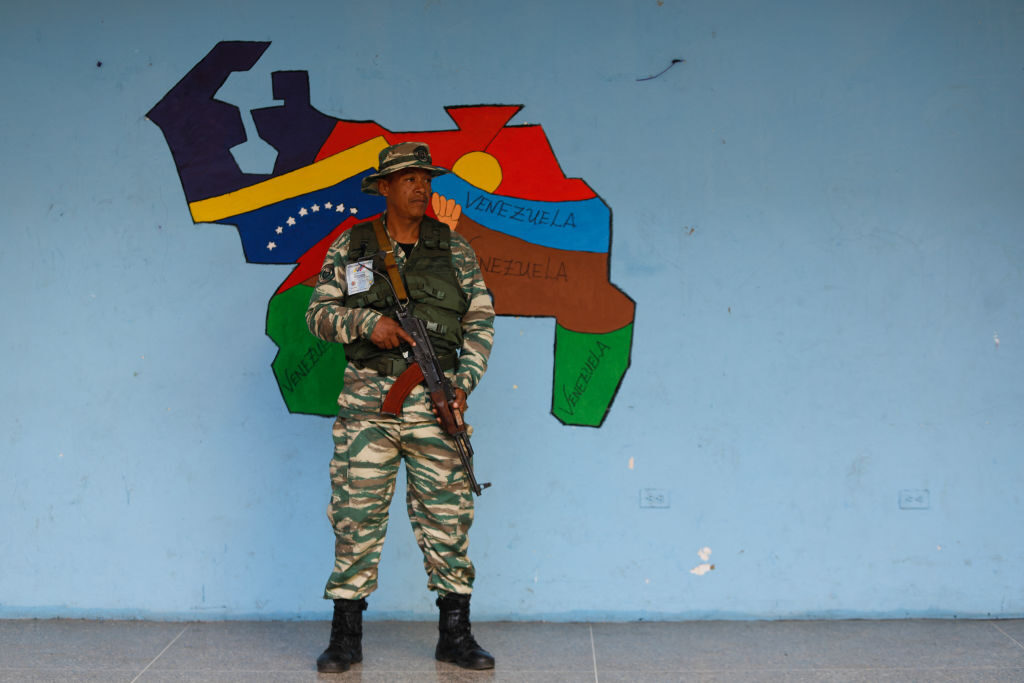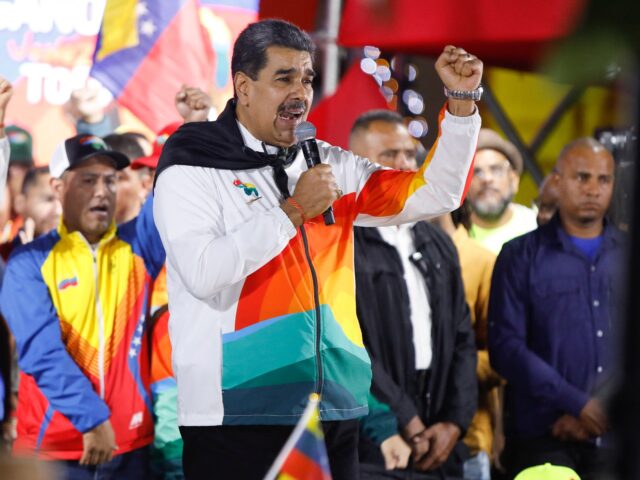CARACAS, Venezuela — The socialist regime here claimed on Sunday that 10.5 million Venezuelans votes in favor of annexing most of Guyana in a sham referendum — a claim disproven by footage taken nationwide and throughout the day of barren voting centers, as well as low turnout tallies at local stations.
Socialist dictator Nicolás Maduro organized a “referendum” on Sunday asking if the public supported the creation of a new state called Guayana Esequiba in a 61,600-square-mile territory disputed between Venezuela and Guyana for over 120 years. The creation of the state would grant residents of the territory, currently representing two-thirds of the entire territory of Guyana, Venezuelan citizenship.
The Maduro regime spent lavishly on a campaign to get the public invested in the Essequibo dispute, pouring the impoverished nation’s public resources into ads, apparel, and even musical concerts and orchestral performances.
Elvis Amoroso, the president of the regime-controlled National Electoral Center (CNE), announced in a late Sunday mandatory broadcast that the CNE logged over 10.5 million votes in favor of the referendum.

A voter casts a ballot at a polling station during a referendum vote in Caracas, Venezuela, on Sunday, Dec. 3, 2023. (Gaby Oraa/Bloomberg via Getty)
He claimed that over 95.5 percent of voters agreed with the Maduro regime’s stance. Amoroso failed to clarify if the 10.5 million he mentioned represents the number of voters who participated or the total votes added up for each of the referendum’s five questions, as every voter had to cast five different “yes/no” votes during the event.
Amoroso also failed to disclose any “official” voter turnout rates in his address, information that the Maduro regime has always issued in past sham elections. In the absence of regime statistics, local and international media reported an extremely low turnout rate. Most voting stations were documented to have been empty for nearly the entire day. In some cases, some voting stations reportedly had more staff than actual voters.
The Spanish news agency EFE reported that, by Sunday noon, some electoral centers in the capital city of Caracas had only registered turnout rates hovering around 12 percent.
#3Dic 9:23 AM #ReferéndumConsultivo#Caracas
Así se encuentra el liceo Avalos donde estudió
Nicolás Maduro en El Valle. – @Punto_deCorte pic.twitter.com/HMaLTIiYKw— Reporte Ya (@ReporteYa) December 3, 2023
🇻 Así lucían los centros de votación hoy, literalmente estaban vacíos. El chavismo dijo que 10 millones de personas fue a votar.
El chavismo se burla de la comunidad internacional y nadie hace nada. La Administración Biden los premia levantando sanciones, hoy ellos envían un… pic.twitter.com/mwf2UYuOkr
— Emmanuel Rincón (@EmmaRincon) December 4, 2023
Maduro, shortly after CNE published the “results” of the referendum, declared the “total success” of the referendum and announced in front of a crowd that a new and “powerful” stage in Venezuela’s territorial dispute with Guyana had started. Maduro did not specify what kind of actions his socialist regime would take regarding the territorial dispute with Guyana after Sunday’s sham vote.
“Today the people spoke hard, loud and clear, and we are going to start a new, powerful stage, because we carry the mandate of the people, we carry the voice of the people,” Maduro said.
The socialist dictator also thanked some “opposition” politicians for their support to his sham referendum, including perennial presidential election loser Henrique Capriles Radonski, in what he described as a fight against the United States. Maduro claims that Guyanese government dealings with ExxonMobil are evidence that the United States is planning to colonize South America.
Capriles, who made repeated calls to participate in Sunday’s sham electoral event, would then call CNE’s results into question on Sunday, claiming that he estimates voter abstention rates at around 89.8 percent.
The Maduro regime’s claim of 10.5 million votes far exceeds the total number of votes allegedly received by the ruling United Socialist Party of Venezuela (PSUV) in previous sham elections — including PSUV’s “best” electoral performance, the 2012 presidential election. According to the CNE’s official results, late dictator Hugo Chávez was reelected for a third time after having received 8.1 million votes. Chávez died of cancer in March 2013, two months after the start of his third term, which automatically triggered a snap presidential election in which Maduro narrowly “defeated” Capriles by a 1.49 percent vote difference.
Historically, Venezuela’s authoritarian socialist regime has used the goal of “ten million votes” as a rallying cry in sham elections. This “goal” was also used by Maduro during the 2018 presidential election, which Maduro organized against handpicked rivals to illegitimately secure a new six-year presidential term.

A member of the Bolivarian Militias stands guard at a polling station during a consultative referendum on Venezuelan sovereignty over the Essequibo region controlled by neighbouring Guyana, in Caracas on December 3, 2023. (PEDRO RANCES MATTEY/AFP via Getty Images)
María Corina Machado – the likely, yet presently banned, candidate against Maduro in a hypothetical “free and fair” 2024 presidential election – criticized the sham vote on Monday.
“In the end, the truth always prevails. We all know what happened yesterday: the people suspended a useless and harmful event to the interests of Venezuela, because sovereignty is exercised, not consulted,” Machado’s wrote on Twitter. “Now we must present an impeccable defense of our rights before the International Court of Justice, with the assistance of our best specialists, and demonstrate that the Esequibo belongs to Venezuela.”
The International Court of Justice (ICJ) issued a ruling this year stating that it has jurisdiction over the Essequibo territorial dispute. The Maduro regime has repeatedly insisted that it does not recognize the court’s jurisdiction in the matter.
Following a request made by Guyana, the ICJ issued a new binding ruling on Friday that ordered Venezuela from refrain from “taking any action which would modify the situation that currently prevails in the territory in dispute,” including holding Sunday’s sham vote. Shortly afterwards, socialist dictator Nicolás Maduro reiterated that his regime does not recognize the ICJ’s jurisdiction on the matter, and that it would carry out the referendum regardless.
Christian K. Caruzo is a Venezuelan writer and documents life under socialism. You can follow him on Twitter here.

COMMENTS
Please let us know if you're having issues with commenting.